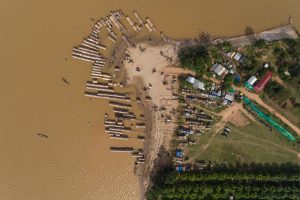Cambodia will start work on a controversial China-backed canal linking the capital Phnom Penh to the sea in August, Prime Minister Hun Manet said yesterday, despite growing concerns from its neighbor Vietnam.
The $1.7 billion Funan Techo Canal will connect the country’s capital Phnom Penh to the coastal province of Kep, lowing the cost of shipping goods between the capital and the country’s only deep-sea port at Sihanoukville and reducing its reliance on Vietnamese ports. China’s state-owned China Bridge and Road Corporation landed the deal to develop the canal during last year’s Belt and Road Forum in Beijing, and it was reported that the project would be funded by Beijing under the Belt and Road Initiative.
In a speech yesterday, Hun Manet said that the country would hold the groundbreaking in August. “We will do it now, we can’t wait for anybody any longer,” the Cambodian leader said, according to the AFP news agency. “(We) do it within the Cambodian territory for the Cambodian people and for the interest of Cambodia,” he added.
China’s state-owned China Bridge and Road Corporation landed the deal to develop the canal during last year’s Belt and Road Forum in Beijing. However, Hun Manet said yesterday that it would fund the project itself.
“Most investors in this project will be Cambodians. As long as Cambodians are united and willing to do it, we can do it,” Hun Manet said. Last month, long-serving former Prime Minister Hun Sen, Manet’s father, called on the country’s circle of immensely wealthy oknha oligarchs to help fund the project. “In case we cannot find capital from outside, we must unite to build this canal,” he told a meeting of oknha on April 26. “Your support and contributions are crucial in this endeavor.”
While Hun Manet has described the project as a means of reducing Cambodia heavy dependence on Vietnamese ports – of “breathing through our own nose,” in his colorful metaphor – the environmental and security implications of the project have drawn scrutiny next door in Vietnam.
The reported Chinese involvement has given rise to concerns that the canal could be used by Chinese warships, while exiled opposition figure Sam Rainsy has claimed that the waterway will turn the Mekong into “a strategic river under Chinese control” that will “allow the transportation of goods, including weapons and ammunition, from China to the Gulf of Thailand.” (The canal will meet the sea 70 kilometers east of the Ream Naval Base, where China is currently funding a significant expansion.)
More pressing are the concerns that the canal will have deleterious impacts downstream in the Mekong Delta. According to the Washington-based Stimson Center, the Funan Techo project “will deliver significant transboundary impacts to water availability and agricultural production in Vietnam’s Mekong Delta, with acute impacts to An Giang and Kien Giang provinces.”
Vietnam has made numerous requests for Cambodia to share information about the project, and enter into a dialogue about the likely impacts, but Phnom Penh has not been forthcoming. Nor has it permitted the Mekong River Commission, of which it and Vietnam are both members, to scrutinize the project.
Whether or not the groundbreaking actually takes place in August, the Cambodian government’s intense eagerness to get started with the project, and its apparent indifference to the views of its eastern neighbor, speaks to the political importance of the Funan Techo Canal. Its very name – conjoining the title of one of Cambodia’s pre-Angkorian polities with an honorific for Hun Sen, who handed power to his son Manet last August – resonates with national pride and political investment by the ruling Cambodian People’s Party (CPP).
In some fashion, the construction of this project serves as a symbolic declaration of independence from Vietnam, to which the CPP has longstanding political connections but which many Cambodian nationalists (including some within the CPP) view with suspicion. It also marks Cambodia’s reversion to its historical tendency in which it has used China to counterbalance Vietnamese encroachments, both figurative and literal.
The way Cambodia’s government has communicated its intents to build the canal has undoubtedly created diplomatic friction with Vietnam. But this appears to be a price that the CPP government is willing to pay in order to pursue its national vision, however vague.

































